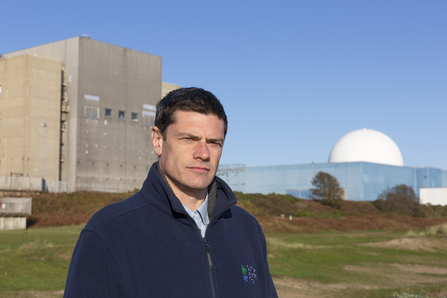
Ben McFarland, Head of Conservation, at Sizewell nuclear power stations (photograph: Sarah Groves)
Sizewell nuclear power stations (photo: Sarah Groves)

Ben McFarland, Head of Conservation, at Sizewell nuclear power stations (photograph: Sarah Groves)
Ben McFarland comments, “We are increasingly concerned over the potential impact from the Sizewell C development. Combined impacts from direct loss of nationally important fen habitat, impacts from water-level change and coastal erosion, as well as lighting and noise on sensitive species such as the rare barbastelle bat, will have a profound impact on wildlife. So far, we are unconvinced that the scale of potential impacts has been fully captured given the impact on rare species and habitats.”
In summary, the main areas for concern are:
Loss of rare and protected habitats
The existing power station is surrounded by special sites for nature, designated and protected as ‘Sites of Special Scientific Interest’ or SSSIs. Despite this protection, a significant area of wildlife-rich land will be lost under the proposed plans. This nationally rare habitat simply cannot be replaced.
Negative impacts on protected species
The Sizewell Estate and the wider landscape is home to nationally important bat populations, including the barbastelle. These populations will be severely impacted by the development. The fragmentation of feeding areas is likely to cause permanent damage to their populations.
Negative impacts on birds
The construction period is likely to last over ten years and noise and lighting will displace many specially protected birds, such as the marsh harrier.
Erosion risk and water level impact
The Suffolk coastline is low-lying, fragile and dynamic. Sizewell C is likely to increase erosion and negatively impact on the Minsmere sluice which controls freshwater levels at RSPB Minsmere and the Sizewell Belts SSSI. Any changes in water levels or salinity would have serious consequences for these SSSIs and the wildlife that depends on them.
Suffolk Wildlife Trust believes that Sizewell C will have a very significant impact on wildlife if it goes ahead.
Ben McFarland’s full response to the Stage 4 consultation can be found here.